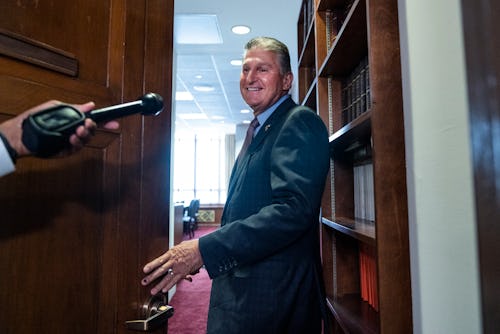Joe Manchin finally agreed to a climate bill. Here’s what’s in it.
The deal, announced by Manchin and Chuck Schumer this week, would be a huge investment in our continued future on the planet.

Well, well, well, it looks like Joe Manchin has finally found a conscience — or at least enough cover to allow him to vote for a climate bill while plausibly denying that he’s doing it to protect the planet. After tanking President Biden’s sprawling Build Back Better bill to address the climate crisis and spending weeks blocking a new effort to reduce emissions, the Democratic senator from West Virginia and coal baron says that he will lend his “aye” vote to the biggest climate spending package in the country’s history.
Just please, for the love of god, don’t call it that.
First, a quick rundown on just what Manchin has said he’s willing to put his name to. The Inflation Reduction Act of 2022, a name that feels extremely like a request from Manchin so he can more easily sell it to his constituents back home, contains nearly $370 billion in spending on climate change- and energy-related programs over the next 10 years.
The biggest portion of that will be tax credits available to companies to make a massive investment in clean energy infrastructure, ramping up manufacturing of equipment and building out the grid with the goal of reducing carbon emissions by 40% before the end of the decade. But the bill would also incentivize the build-out of wind, solar, hydrogen, and nuclear power, as well as speed up the development of energy storage and carbon capture technologies. It would additionally extend new electric vehicle tax credits: $4,000 for used vehicles and $7,500 for new ones.
On top of expanding clean energy, the new bill would also punish polluters. A new fee that will punish oil and gas companies for methane emissions is written into the proposal and would go into effect in 2025. In addition to that, $60 billion has been set aside to clean up existing pollution that disproportionately affects low-income communities and people of color.
It ain’t just climate that is getting a boost from this bill, either. It’s also going to pour $64 billion into the Affordable Care Act to extend the subsidies that make health care plans more affordable and give Medicare the ability to negotiate prescription drug prices, which is expected to make them significantly cheaper.
To pay for all this, the government will close a loophole that allowed corporations to avoid paying a 15% minimum tax. That, along with stricter enforcement by the Internal Revenue Service, is expected to raise about $739 billion over 10 years — $300 billion of which will go toward paying down the federal deficit.
All of that sounds great, right? Here’s the catch: It might not pass. Per Politico, the Senate intends to vote on it next week, and the Democrats will need to cling on to all 50 votes in order to pass it. It’s possible that even with Manchin on board, his typical partner in inaction, Arizona Democrat Kyrsten Sinema, could tank the deal. The House of Representatives could also potentially hold it up, should any Democrat there decide they want to try to sneak their own pet legislation into it.
And then there’s the Senate parliamentarian. For this thing to pass, the obscure arbiter of all Senate rules will have to rule that the bill meets the qualifications for reconciliation, which allows budget and spending bills to pass with a simple majority rather than the standard 60 votes.
The parliamentarian has already killed one major Democratic spending bill, so it’s really anyone’s guess if this thing stands a chance. But all of that is only even a concern because Manchin finally decided to vote for something that will help address climate change. The biggest hurdle has already been cleared. Let’s hope there is enough momentum to jump these last few, smaller ones.